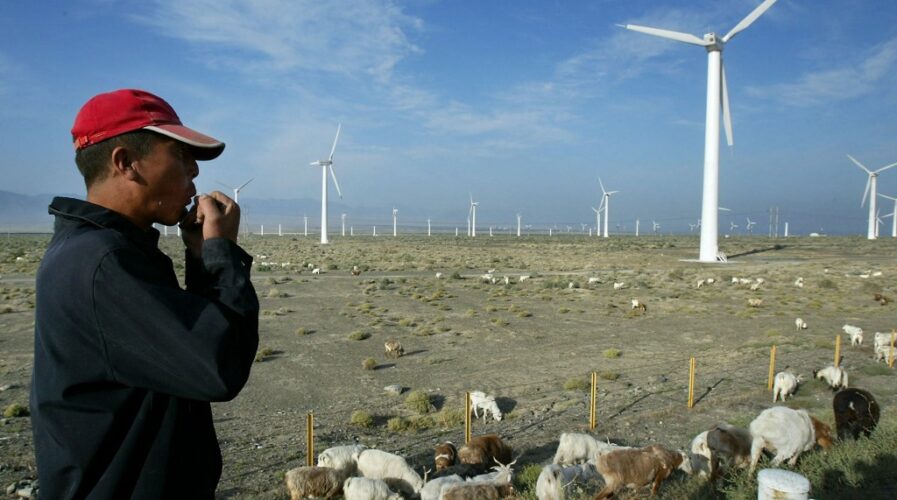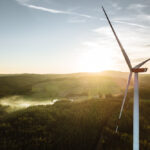
A sheep herder whistles as he follows his flock through a wind power farm outside of Urumqi. China Photo by Frederic J. BROWN / AFP
Big Tech spearheads green energy projects around APAC
- Amazon announced its first renewable energy project in Singapore – it’s fifth in the Asia Pacific
- Ant Group pledges to become carbon neutral by 2030
- As larger corporations widely adopt a sustainable way of operating their business, small and medium enterprises may just follow suit
Reports have revealed that environmental consciousness in large companies has a direct correlation with its profitability. Be it for greater profits, productivity, or cleaner ethics, major corporations have begun taking larger steps towards reducing their carbon and waste footprints while adopting sustainable and green energy technology.
To offset the massive amount of waste, a number of tech companies are working to become more sustainable, both internally and in their consumer-facing products. The impact of these efforts could substantially lessen the number of electronic waste in landfills and the overall footprint of the tech industry.
In the Asia Pacific region, China, Australia, and India are some of the countries which dominate the renewable energy market, mainly due to the increasing investments made into the development of renewable energy. Australia has focused particularly on the development of solar and wind sources of renewable energy. China has made significant investments into renewable energy infrastructure and development while India had the highest renewable energy attractiveness score throughout the Asia Pacific region in 2018.
The likes of Cambodia and Taiwan, on the other hand, experienced significant growth in investments into renewable energy capacity in 2019. The imperative for green businesses in Asia and the Pacific are also growing since in many Asian countries, governments are introducing policies and incentives to drive mainstream adoption of sustainable approaches to consumption and production.
Amazon’s first renewable energy project in Singapore
Recently Amazon, who is incidentally also the largest-ever corporate purchaser of renewable energy, announced its first renewable energy project in Singapore. The project is Amazon’s fifth in the Asia Pacific region, as part of its commitment to invest in global solar and wind projects globally.
In this project, Amazon will be working with solar energy provider Sunseap Grou in a long-term agreement to export 62 megawatts (MW) of clean energy to the Singapore electricity grids. It is expected to generate some 80,000-megawatt-hours (MWh) of clean energy annually, which is equivalent to powering more than 10,000 homes in Singapore.
When completed in 2022, the solar project which is made up of a series of solar panels mounted on a ground system, will be among the largest aggregated movable solar systems, designed and installed in Singapore. The project supports Singapore’s bold vision outlined in the Singapore Green Plan 2030, a ten-year plan with a nationwide sustainable development agenda. Amazon and its cloud arm Amazon Web Services (AWS) have been investing and growing their interests in Singapore for over a decade now.
This project will supply renewable energy for Amazon offices, fulfillment centers, and AWS data centers that support millions of customers globally. It will also help advance Amazon’s goal under The Climate Pledge to reach net-zero carbon emissions across its business by 2040. Part of that commitment is powering its operations and infrastructures with 100% renewable energy by 2030, a goal that Amazon is on the path to reach five years earlier by 2025.
Ant Group pledges to be carbon neutral by 2030
The financial technology affiliate of e-commerce giant Alibaba Group Holding Limited has pledged to become carbon neutral by 2030. Ant Group pledged its support to bring down emissions through technological innovations, joining the urgent global efforts to curb climate change and its devastating effects.
The company will also set up a carbon neutrality fund to support the research and development of renewable energy and other green technologies, and work with industry partners to promote green finance. Ant Group has detailed a roadmap to neutralize direct and indirect emissions associated with the purchase of electricity from this year and by 2030, it will fully cancel out carbon emissions generated from external sources it does not own or control, including within its supply chain and business travel.
Taking advantage of its leading capabilities in developing blockchain technology in real-world applications, Ant Group will also explore ways to apply blockchain solutions to the climate effort, including using the technology to track the carbon reduction process.
What could this shift mean for SMEs in APAC?
In the Asia Pacific, SMEs undertake most of the private economic activity and account for more than 60% of employment, and around 30% to 60% of GDP. Once larger corporations widely adopt a sustainable way of operating their business, small and medium enterprises may just follow suit, considering the advantages it carries.
First, it benefits the bottom line and since every SME wants to reduce costs to improve cash flow, adopting sustainable practices can help achieve that. Also, having a sustainability model will open up new customer opportunities and in terms of risk management, putting sustainable practices in place and improving your ability to measure and report on your environmental footprint can help heighten your understanding and ability to manage environmental risks.
READ MORE
- Ethical AI: The renewed importance of safeguarding data and customer privacy in Generative AI applications
- How Japan balances AI-driven opportunities with cybersecurity needs
- Deploying SASE: Benchmarking your approach
- Insurance everywhere all at once: the digital transformation of the APAC insurance industry
- Google parent Alphabet eyes HubSpot: A potential acquisition shaping the future of CRM


